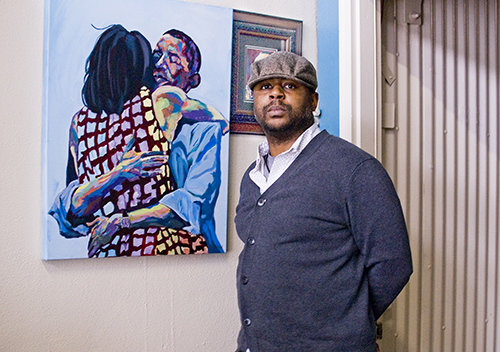
PHOTO BY CLARE HOWARD
Ryan Rashad Reed stands in his studio near a portrait of Barack and Michelle Obama. Reed uses his art to advocate for justice and understanding. His work often depicts struggle overcome with grace.
Peoria artist Ryan Rashad Reed uses his art to convey justice, beauty, triumph and struggle.
Many people consider Reed, 40, to be one of Peoria’s most accomplished young artists. He is quick to say he strides for mastery but hasn’t yet arrived there. He credits a great master’s program at Hampton University in Hampton, Virg., and working in Peoria with Preston Jackson and others.
“I convey the beauty of Black people and the beauty of work –– warts, triumphs, confrontations, trial and error, and the repetitive theme of struggling to move forward,” he said. “It’s about meeting hurdles with grace.”
Seeing the world through the eyes of an African American artist gives him insight even some of his close friends in the Peoria art community have not perceived.
Reed’s thesis committee in college forced him to remove the term Euro-American from his thesis, contending it was racist. But African-American was an acceptable reference.
Reed said he did not use Euro-American as a racist reference but several on his committee said Caucasian Americans had severed all connections to Europe so the term was racist. He ultimately removed it because he needed his committee to sign approval for his thesis, but he refutes the notion it is a racist term or that Caucasian Americans have severed all connections to Europe.
Even different reactions to the death of Britain’s Princess Diana underscore Reed’s perception. Had he still been at Richwoods High School when Diana died, the death would have been discussed for days, but at Hampton University, an HBCU school, it was merely acknowledged and students moved on, he said, noting the British royal family commands more attention among Euro-Americans than among African Americans.
One of Reed’s pieces, a limited reproduction of the Scottoboro Boys, was presented to Kim Foxx, Cook County State’s Attorney, after she delivered the keynote address at the Diversity Luncheon of the Peoria County Bar Association. The original painting, created in 2001, is 3.5 feet by 6 feet and is in a private collection on the East coast.
The Scottsboro Boys became infamous when they were arrested in 1932 for an alleged rape that ultimately was proven to be false but many of the young African-American males spent decades in prison. The story resonates with the Central Park Five that resulted in the arrest, trial and incarceration of young African-American men for a rape in Central Park. All were ultimately acquitted but not until after years of incarceration.
The Tulsa Race Massacre of 1921 destroyed the prosperous African American neighborhood of Greenwood following an accusation of sexual assault that was later disproven. Estimates are between 300 and 600 Blacks were killed and more than 1,000 homes and businesses destroyed in the violence over the false assault allegation.
Reed said this is a repetitive theme often not seen through Euro-American eyes. His art can expand that lack of perception and focus on the world as it is and as it might be.
“Society is a broken record. One of my goals is to help people understand the world,” he said. “Art can help educate people. Art can help us see something that then becomes difficult to ignore. Once we see the suffering and challenges, that’s hard to ignore. There is beauty in the struggle. Beauty in moving forward.”
A number of his portraits including Cleve Heidelberg, Alstory Simon and Mae Winston are in the windows of the new offices of Hale & Monico at 701 Main St. where Don Jackson will be of counsel.
Reed’s studio, Creativity Uncorked, is at 815 SW Adams St. He can be found on instagram at RashadArt and on Facebook.

3 comments for “Art and Justice | Ryan Rashad Reed”